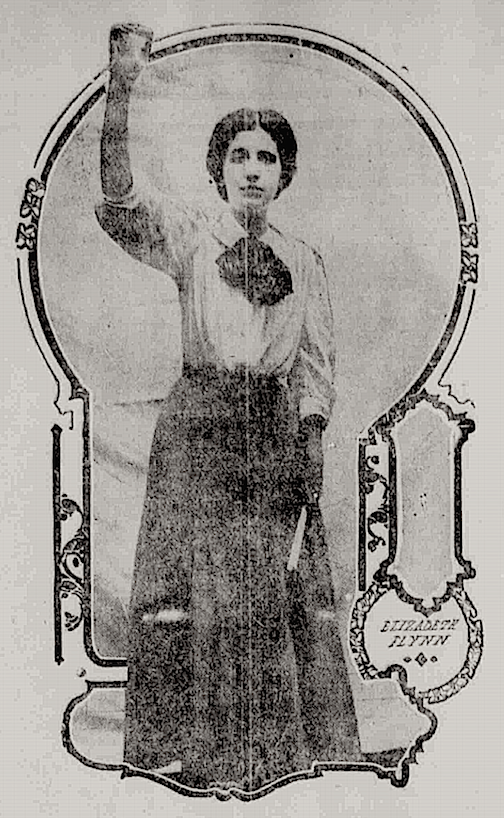
~~~~~~~~~~~~~~~~~~~~~~~~~~~~~~~~~~~~~~~~~~~~
Hellraisers Journal, Wednesday November 27, 1907
Duluth, Minnesota – Elizabeth Gurley Flynn Speaks to Packed House
From The Industrial Union Bulletin of November 23, 1907:
THE GIRL WITH A MISSION
—–
Elizabeth Gurley Flynn Addresses a Packed House
at Duluth on Industrial Unionism
The visit of Elizabeth Gurley Flynn to Minnesota in behalf of the Industrial Workers of the World is arousing great interest among the workers of that state. She spoke on Sunday night, November 17, at Duluth, to an audience that filled Odd Fellows’ hall. From an interesting report of the meeting in the Duluth Harald we take the following extracts:
Elizabeth Gurley Flynn is nothing if not earnest. Socialistic fervor seems to emanate from her expressive eyes, and even from her red dress. She is a girl with a “mission,” with a big “M,” and she delivered her sweeping generalities with perfect indifference as to where they hit.
She spoke to an audience which packed Odd Fellows’ hall last evening. There were a few labor leaders there out of curiosity; a scattering of women who were curious to see this strange school girl with the strange mission in life, and a large number of followers of the Socialistic doctrines expressed.
Characterizing the American Federation of Labor as organized scabbery, and branding it as a labor trust working injury to the majority of laborers for the benefit of the minority, the girl orator was evidently voicing the sentiments of many of her Socialistic followers in the room, but her statements in this respect made the several local labor leaders present hitch uneasily about in their chairs.
Another statement which the union men present did not appear to look upon with favor was to the effect that it would be better for everybody concerned if Japanese labor were not excluded from this country. The speaker said all laboring men were brothers, and argued that they should work together as such, no matter what their nationality might be. She claimed the barring of Oriental labor from America would result, and already had resulted, in American manufacturers building their factories in Japan.
Miss Flynn said to start with that she was a member of the Industrial Workers of the World, and that the meeting was held under the auspices of that organization. She took up the idea that there are no class distinctions in America, and attempted to prove that there were such distinctions existing here, despite everything that has been said to the contrary. She said there would be some excuse for the idea if all the people were earning their living at present as did the Americans at the time of the Revolutionary war, but showed how living conditions had changed entirely since then. In the early days a community was sufficient unto itself. Most of the men owned farms, and the tools on the farms. Those who worked otherwise for a living did so with small hand tools owned by themselves, and the product of labor with those tools was the property of their owner, the man who had done the work. Individual butchers, shoemakers, etc., supplied the wants of the people in their community in their particular lines, while the housewife attended to the cloth-making. In short, the people were independent of any outside influence, and the measure of their prosperity depended entirely upon their own endeavor.
Present conditions are absolutely removed from conditions then existing, said Miss Flynn. The last seventy-five years have evolved an entirely new and different stage of development, brought about chiefly through the separation of the laboring man from the ownership of the machines upon which or with which he works. The labor saving machine of today was characterized as being a social tool, and labor conditions generally were put under the same classification. The Chicago stock yards were cited to make clearer the speaker’s meaning. Each man employed there is merely a cog in a big machine. Only a tiny fractional part of the big work can be done by him, or is known by him, where seventy-five years ago the laborer in any line had to be skilled, and had to have knowledge of all parts of his work, so that he might alone turn out a complete product.
Labor saving machines she called inanimate competitors of the workingmen, embodying in themselves the skill that formerly was necessary to the man. Less skilled labor is required with the new machines, and women and children, at starvation wages, are called upon to do the work formerly performed by man. They do the work as well, and much cheaper than can the men, for the simple reason that no skill is required. Some one is needed to watch the machine, and anyone will do.
Miss Flynn argued that under existing conditions laboring men have not the right to life, liberty and the pursuit of happiness. She showed it to be a fact, by figures in her possession, that the so-called capitalistic class controls 99 per cent of the wealth of the country, and that the capitalistic class comprises only 1 per cent of the people.
The whole trouble, said the speaker, lies in the fact that the working class do not control the means of producing wealth. If it did control such means, everything would be plain sailing, and everybody would be happy, according to the arguments of Miss Flynn. No machine or industry can be run without the assistance of labor. She said the workingmen were not by any means getting their share of the profits accruing from their labor, and asserted that this share would not be forthcoming until such time as the means of producing wealth was owned by the laboring class instead of by the capitalistic class.
The argument that the capitalist was deserving of his profits because of special ability and the ownership of wealth-producing machinery did not hold water, Miss Flynn maintained, because all of this labor-saving and wealth-producing machinery was invented and created by men from the poor laboring class, and after the creation was operated by the men from the laboring class.
[She said:]
When man can buy ideas, brain and creative ability on the market, he doesn’t have to have any brains of his own, and it not necessarily possessed with special ability. The working man is entitled to the profits resulting from the operation of the machine upon which he works, and which was invented and created by working men. Profits should go to the man making them possible. The very existence of the capitalistic class is proof that the laborer does not get all that is coming to him.
The laboring man of today, she asserted, is a slave who sells himself, and who is worse off than were the black slaves of the south before the civil war. The black slaves represented a cash value, and their owner took care to see that they were properly fed, clothed and housed, for ill health and death meant a money loss to him. Slaves of the present have no cash value to their employers out side of their ability to work, and no one cares whether they are sick and dead or alive and well, for as soon as one laborer drops from the ranks his place is filled by another at the same price. The wage slave is more profitable to the master than was the black slave before the war, she said.
Miss Flynn deplored the fact that laboring classes were at war among themselves, and said that capitalists were careful not to injure their own interests by fighting among them selves. She favored labor unions, but said unions must be formed according to the whole industry, taking in everybody connected with any one line of work, instead of being organized according to small departments of the big work, and charging initiation fees that bar the jobless man. If everybody in any way connected with maintenance and operation of a railroad belonged to the same union, for example, the road would be completely tied up in case of a strike.
[Concluded the speaker:]
Labor produces all the wealth and must organize to assume control of production, before laboring men will have the right to life, liberty and the pursuit of happiness.
[Photograph added.]
~~~~~~~~~~~~~~~~~~~~~~
SOURCE
The Industrial Union Bulletin
(Chicago, Illinois)
-Nov 23, 1907
https://www.marxists.org/history/usa/pubs/industrialworker/iub/v1n39-nov-23-1907-iub.pdf
Note: The idea that the wage slaves of the day were worse off than the chattel slave had been in the old south was, unfortunately, a common propaganda point among socialist in the early 20th century. It seems doubtful, to yours truly, that any wage slave anywhere at any time would prefer being sold as piece of property, and family members in the same condition, rather than being forced to sell their own labor power at so much per hour, no matter how exploitive the conditions of labor.
IMAGE
EGF, DEN p21, Sept 21, 1907
https://www.newspapers.com/image/87255888/
See also:
Born in Slavery:
Slave Narratives from the Federal Writers’ Project, 1936 to 1938
https://www.loc.gov/collections/slave-narratives-from-the-federal-writers-project-1936-to-1938/
27 Million People
http://freedomcenter.org/enabling-freedom
I Hate the Capitalist System – Barbara Dane
Lyrics by Sarah Ogan Gunning
http://www.folkarchive.de/gunning.html
http://www.folkarchive.de/ihate.html

